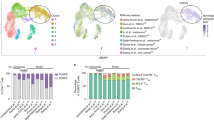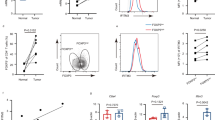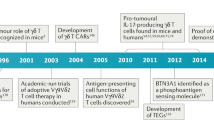Abstract
Regulatory T cells (Tregs) expressing forkhead/winged-helix transcription factor Foxp3 represent a distinct lineage of lymphocytes which play a central role in protecting the host from autoimmune diseases. However, Tregs also pose a major problem to anti-tumor immunity. Growing body of evidence from both laboratory and clinical investigations has demonstrated that expansion and accumulation of these immunosuppressive cells correlates with advanced tumor growth and predicts poor disease prognosis. How tumor development subverts normal self-tolerance function of Tregs thereby thwarts host anti-tumor immunity remains elusive. This review will discuss our current knowledge in understanding the dynamics and plasticity of Foxp3+ Treg activation and induction in tumor bearing hosts and their interaction with various antigen presenting cells (APCs) in tumor microenvironment leading to the establishment of active local and systemic immune suppression.
This is a preview of subscription content, access via your institution
Access options
Subscribe to this journal
Receive 12 digital issues and online access to articles
$119.00 per year
only $9.92 per issue
Buy this article
- Purchase on Springer Link
- Instant access to full article PDF
Prices may be subject to local taxes which are calculated during checkout
Similar content being viewed by others
Author information
Authors and Affiliations
Corresponding author
Rights and permissions
About this article
Cite this article
Qin, FF. Dynamic Behavior and Function of Foxp3+ Regulatory T Cells in Tumor Bearing Host. Cell Mol Immunol 6, 3–13 (2009). https://doi.org/10.1038/cmi.2009.2
Received:
Accepted:
Issue Date:
DOI: https://doi.org/10.1038/cmi.2009.2
Keywords
This article is cited by
-
Conditioning treatment with CD27 Ab enhances expansion and antitumor activity of adoptively transferred T cells in mice
Cancer Immunology, Immunotherapy (2022)
-
Expansion of regulatory GITR+CD25low/-CD4+ T cells in systemic lupus erythematosus patients
Arthritis Research & Therapy (2014)
-
Cure of metastatic growth of EMT6 tumor cells in mice following manipulation of CD200:CD200R signaling
Breast Cancer Research and Treatment (2013)
-
Distinct in vivo CD8 and CD4 T cell responses against normal and malignant tissues
Cancer Immunology, Immunotherapy (2013)
-
Cervical cancer cells induce apoptosis in TCD4+ lymphocytes through the secretion of TGF-β
Archives of Gynecology and Obstetrics (2013)



